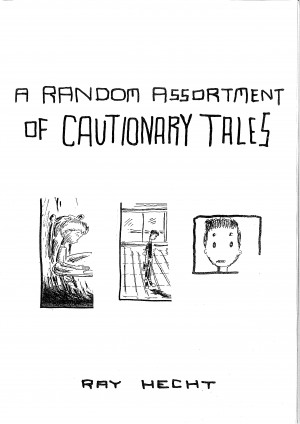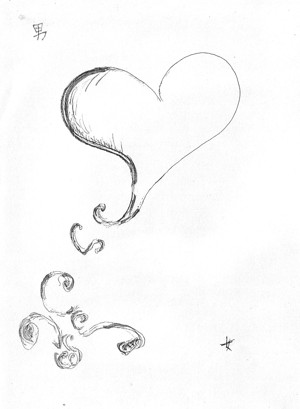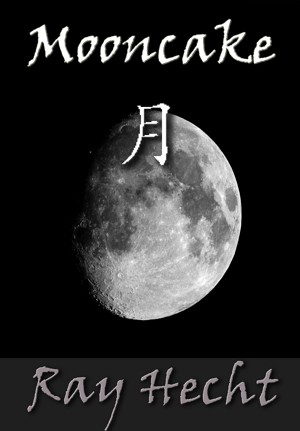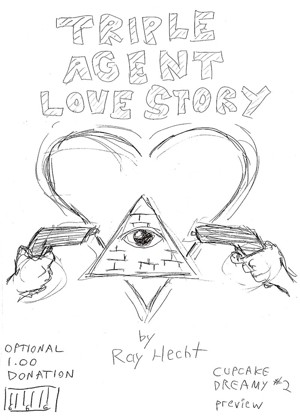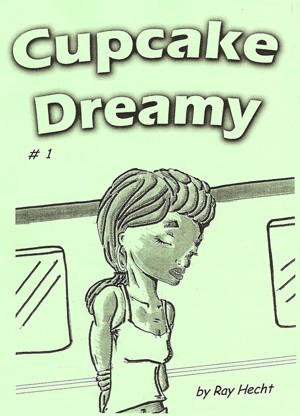Interview with Ray Hecht
Published 2014-08-03.
How old were you when you started writing? When did you know you wanted to be an author?
I always had a fondness for writing, but I wanted to be an artist when I was young. When I was little, I wanted to be a paleontologist. Obviously. After a wayward youth, I eventually took film classes in California and tried my hand at screenwriting. Though I enjoyed my student films, I learned that I don’t play well with others. What I truly adore is the purity of prose writing; it’s just the one author and a blank page and that’s all you need to tell stories. I started writing novels when I was twenty-three. Almost a decade ago. My first attempts may not have been very good, yet slowly and slowly I got better at it perhaps I’m a bit decent at this point…
What would you say motivates you to keep writing?
I don’t know. I just feel compelled. Like I’m used to it at this point in my life. I don’t feel productive unless I’m working on a long-form writing project.
I often tell aspiring writers that it’s a bad idea to be a writer. It’s very unthankful. It’s not cool at all, not romantic. Years and years of thankless work that no one will appreciate. And if you actually do think you’ll achieve a modicum of success, well that’s about as realistic a goal as winning the lottery.
But I just can’t help it. I’ve had a lot of empty, sleep-deprived nights. Little payoff so far. That’s not the point. I just want to write so I write.
Who are some of your favorite authors? What are you currently reading?
I tend to read contemporary. Honestly, I’m far behind on the literary classics. I like something that makes you think, something a tad profound. I like drug literature, spiritual topics, nonfiction pop science, and catching up on China and the East.
Irvine Welsh is a big inspiration. Of course there’s “Trainspotting”, but the whole internal universe of his goes far deeper than his famed first novel. In some ways the prequel “Skagboys” is better than “Trainspotting” itself, though the latter was first so it’s more brilliant. I just reread “Filth”, and I look forward to reading “Crime” next.
The greatest American writer is probably Bret Easton Ellis. “American Psycho” is classic, but I think “Glamorama” takes those themes of vapid modernity even further. About terrorism in New York City, I liken it a post-9/11 novel written in the 1990s.
That’s literary. I’m a great fan of science fiction – although I’m definitely not smart enough to write good science fiction of my own. I’ve read everything by post-cyberpunk author Neal Stephenson. I’ve read everything but the massive Baroque Cycle by him, I think he’s both brilliant and hilarious which is a very important combination to be. He explains hard scientific and technological concepts very well in layman’s terms, without being pretentious and with a lot of fun. “Snow Crash” is still one of my all-time favorites and ages well, and “Cryptonomicon” (while not technically science fiction) is my favorite historical novel. “Anathem” is underrated in my opinion, I wish more people would read it but the alien language part throws off a lot of people. The first half you will consult the glossary often, and in the second half you get used to it and it reads smoothly while you learn high-intensity concepts. No book quite like it.
Leaving out so much. Haruki Murakami. Mo Yan. Janet Fitch. Hubert Selby Jr. Robert Anton Wilson. P.K Dick. Burroughs. And more and more.
I also read a lot of comics, American and British and Japanese, but no time to even get into that right now.
What is your method of writing?
My process utilizes an outline, but it may look like scribbling to most people. I write down random ideas on various pieces of paper and scatter them all over my floor. It’s vague, but something starts forming in my mind, and I eventually organize it all.
Many of my ideas are made up as I go along. While in the midst of typing, certain things come up.
I do have the general idea in mind from the beginning, and a manuscript slowly develops. But I definitely have to do a lot of re-writing after the first draft. First drafts are rarely any good, that’s just the way it is.
How long does it take you to write a full manuscript? Do you give yourself a word limit for each day or a time limit to finish your novel?
It never works to make a promise to yourself to write everyday, at least it doesn’t work for me. Those promises tend to get broken and then you give up and get lazier and lazier. Not a realistic method.
I do write almost everyday, but often that means I write a blog or write an article. Doesn’t necessarily mean I’m working on my novel.
What works well for me is to organize the word count in broader terms: by the month. Compartmentalized into the week. I used to do 10,000 words a month (which isn’t that much, but y’know I got to go to make a living and all) and that’s 2500 words a week. Sometimes I write only 500 words in one sitting, then skip two days, then write 1500 words the next sitting. Whatever. However, that doesn’t count even editing and rewrites.
Now I find 12,000 words a month at 3000 words a week is doable. This is all a method I can stick to, it works for me.
At this pace, it reasonably takes about a year to complete a manuscript. I’ve written two novels at over 100,000 words like this. But they still needed work after the draft, and it’s more like a year-and-a-half to two-years to really finish.
How do you come up with your character names and geographic locations?
I love coming up with names, but couldn’t tell you how. I hear a name I like and I save it in my head for later. Sometimes there is a special meaning behind it, a ‘Danny’ or a ‘Marco’ or an ‘Amber’ imply a certain personality. But mostly I just like a name and use it.
The geographic location is very important and absolutely comes from what cities I’ve lived in. I believe that the setting should be a major character with its own distinct personality. That can only be done right if I know a place very well. Hence: Los Angeles, Indianapolis, Cincinnati, Shenzhen, Guangzhou, etc…
Do you only write during a certain time of day?
I am a night person. After midnight is best, at about 1:00 to 2:00 a.m. I can really be on fire. They most important thing is to write when everyone else is asleep and leave you alone.
Do you “always read” or do you take breaks between reading books?
I always read. When one book is finished, I’m on to the next. I can be a slow reader at times, might take me a while, but I cannot be without a book on my shelf or a paperback to console me on long train rides.
How often do you write?
Not often enough these days.
Do you do your own editing or send it to someone else?
Can’t edit yourself. Whoever is willing to edit, please edit. Sometimes I employ professionals, often I just beg friends and/or find a writer’s group in my town to help with spotting typos and such.
What is the most difficult thing you have ever researched for one your books?
The most difficult research I’ve done was for my novella “The Ghost of Lotus Mountain Brothel”. 1911 was as tumultuous time in Chinese history, and I had to learn everything about the peasant lifestyle and geopolitical turmoil and revolutionary backdrop. I also had to learn about the courtesan culture. So I went to museums, I watched movies, I read books, l bookmarked articles online, and I took notes. The most time-consuming part was exploring old parts of Guangzhou and learning the landscape.
I only hope it worked, I hope my story has a feel of authenticity.
I am currently researching the business of Japanese AV and the adult toy industry for a future novel set in Hong Kong. You’d think it would be a fun topic, but in fact it’s hard to find English-language resources on the subject. I’ll also have much more in-person exploring to do in order to get the setting right.
Whenever a story involves a lot of research, it takes that much longer to write the damn thing. I can research for months, write very intermittently and continue to scribble outlines, before I’m finally ready for the hard part/fun part of spending all those midnights typing.
And yet, when at last I have a manuscript at hand, it is all worth it.
Smashwords Interviews are created by the profiled author or publisher.
Books by This Author
Mooncake
by Ray Hecht
(4.50 from 2 reviews)
It is Mid-Autumn Festival in Lunar Colony 01111001's Chinatown, a holiday celebrated by eating mooncake and regaling with tales of Chang'e flying to the moon.
Little Xiao Yue asks her grandfather what it all means. There is always a generation gap. How can precocious children in the future understand the metaphor?
Enjoy this short short, a taste of one writer's science fiction and Sino overlap..
Cupcake Dreamy #1
by Ray Hecht
(4.00 from 1 review)
Shopping Spree. It can mean different things to different people. In this first installment of the indie comics series Cupcake Dreamy we find Angie and Kent, two lost souls wandering the streets of Hollywood. As they say, this is where dreams go to die. And some may take that too literally.

